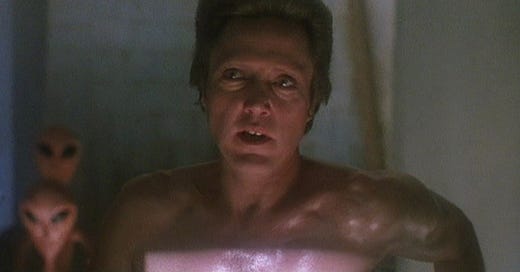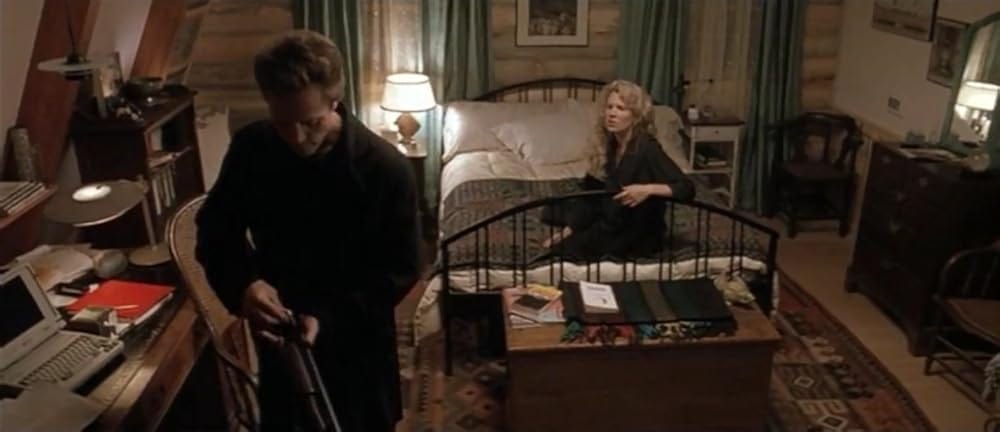Communion (1989)
5/10
Seeing the classic alien-abduction scenario play out in live action makes it painfully clear how absurd these stories are. What can seem merely far-fetched or implausible on the page becomes downright silly on film, particularly if the special effects and production design are lacking. Add a miscast Christopher Walken and you get Communion, a film less likely to frighten viewers or create a sense of wonder than it is to provoke unintentional laughter.
Based on the eponymous book, allegedly “non-fiction”, by Whitley Strieber, Communion stars Walken as Strieber, a successful author in New York who experiences unsettling episodes and “lost time” while staying with his family at their upstate cabin. Hypnosis sessions with psychiatrist Janet Duffy (Frances Sternhagen) uncover seemingly repressed memories in which Strieber is abducted by unknown beings, whom Striber has called “The Visitors”. These include little blue doctors, who look like a cross between trolls and the Jawas from Star Wars, and “greys”: the iconic alien visitors with small hairless bodies, large heads, and large black eyes.
A big problem with the film, and I hate to say this, is Christopher Walken’s casting as Strieber. I’m a huge fan of Walken, but unfortunately, the actor has such distinctive mannerisms that it can be difficult to believe him in the wrong role. Unlike some critics, I had no issues with his turn as Emperor Shaddam IV in Dune: Part Two; Walken’s presence there fit in with the larger-than-life science-fiction universe Denis Villeneuve’s adaptation created. But it doesn’t work as well in Communion, where Walken plays an “ordinary” person who has an extraordinary experience.
I’ve never seen any interviews or footage of the real Whitley Strieber, so I have no idea what his mannerisms are like. But Walken’s iconic weirdness unfortunately makes it more difficult to empathize with his character. There’s nothing technically wrong with his performance. Walken does a good job conveying the emotions of a man who can’t explain what’s happening to him and wonders if he’s going crazy. Still, I feel the film might have been more effective with an “everyman” actor as Strieber. It’s a lot like Jack Nicholson in The Shining, where Nicholson’s casting makes the viewer presume his character will go crazy. Nicholson’s performance as Jack Torrance is incomparably more iconic and entertaining than Walken’s Strieber, even as both actors are inherently charismatic and watchable.
Director Philippe Mora does a decent job creating atmosphere when Strieber’s family are at his cabin in the woods, yet the scenes of bright lights outside and Strieber being carried away feel too much like a 1980s music video: that is, silly and cheesy. It’s the scenes of Walken interacting and conversing with the aliens that become truly laughable, though—coming off like outtakes from the Mos Eisley cantina scene in Star Wars or a subpar Muppet Show sketch. The “greys” are faithfully recreated from the iconic book cover, but never feel like actual living beings.
Communion has some decent music courtesy of Allan Zavod and Eric Clapton, but it’s more atmospheric than anything, lacking in memorable melodies, and often too similar to John Williams’ classic score for Close Encounters of the Third Kind. Supporting performances are hit and miss: Lindsay Crouse does her best to convey the appropriate grief and confusion as Strieber’s wife Anne, but Joel Carlson as his young son Andrew grates on the nerves, due more to Mora’s direction than any fault of the child actor.
On a personal note, as a ’90s kid, I grew up in a decade that saw a vast upsurge of cultural interest in aliens, UFOs, and government conspiracies, from The X-Files to Independence Day. I was a fervent reader of books on UFOs and alien abductions, as a 10-year-old even being convinced I had seen a UFO. I read about Strieber’s story and terrified myself imagining a similar scenario of otherworldly visitors showing up at my house, in a way no different from being scared of ghosts.
As an adult in the 2020s, however, I can’t help but notice that accounts of alien abduction have declined significantly since camera phones became ubiquitous. Strangely, now that everyone has a camera with them at all times, we don’t hear as many stories about people being abducted by aliens.
I don’t know what happened to Whitley Strieber, a successful science fiction and horror author who created a new stream of revenue for himself by alleging that he was abducted by strange non-human visitors. The film Communion isn’t sure what happened, either, settling on the idea that these visitors have become a part of Strieber’s life—a bland conclusion that takes no stance one way or the other. Like many tales of alien abduction, the premise is interesting, but the payoff once you sift through the evidence is disappointing.






